Aksakov on partnership banking experiment: ‘Most likely, an initiative will be introduced to extend it for 5 years’
Ingushetia, Chuvashia, and Crimea may be included in the federal partnership financing experiment
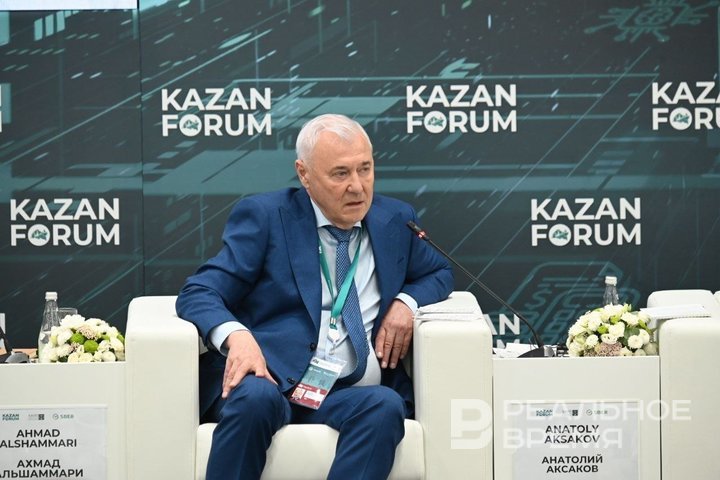
“The lessons of the financial crisis have shown that the traditional banking system does not always respond effectively to the challenges of the time. Under conditions of geopolitical tension, Islamic banking will develop more rapidly. The potential is up to 500 billion rubles," this is how the Chairman of the State Duma Committee on the Financial Market Anatoly Aksakov assessed the future of new instruments at the first international conference under the auspices of AAOIFI, held as part of KazanForum. The federal partnership financing experiment, launched in 2023, will continue after September 1, but the question remains — for how long? Aksakov proposed in Kazan to extend it for another 5 years, although the authorities of Tatarstan had earlier advocated for a permanent transition. For now, a “technical” option has been adopted — an extension until 2028. More details on the situation — in the report by Realnoe Vremya.
Khusnullin, Levitin, Kogogin spend two days at Kazan Expo
This morning marked the official opening of the Russia — Islamic World: KazanForum 2025 International Economic Forum, with the first high-ranking federal guest being Deputy Prime Minister of Russia and head of the event's organising committee Marat Khusnullin. Accompanying him to Kazan was Dr Ahmad Kawesa Sengendo, Deputy Secretary General of the Organisation of Islamic Cooperation for Economic Affairs. Early in the morning, they were warmly welcomed by Rustam Minnikhanov, after which the three posed for a photograph in the lobby of Kazan Expo.
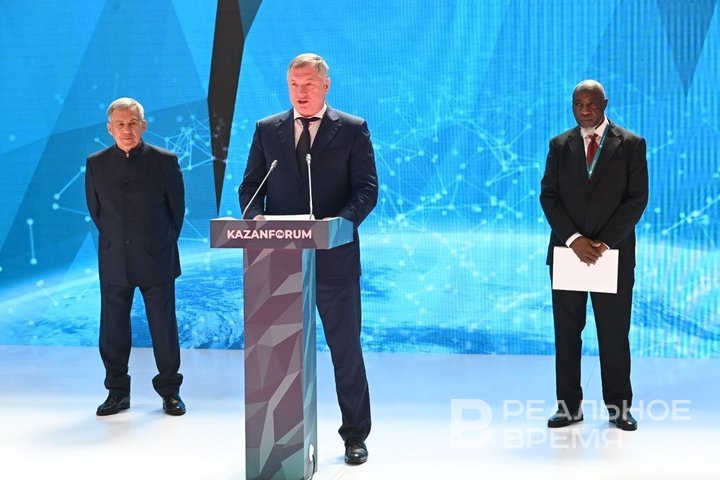
Later by midday, other high-ranking guests could be seen in the corridors of the exhibition centre. Presidential aide Igor Levitin was actively discussing the development of the North–South international transport corridor in the sidelines, while Russia’s Minister of Construction Irek Fayzullin held a business meeting with a delegation from Uzbekistan. Around 3 p.m., KAMAZ CEO Sergey Kogogin visited the exhibition pavilion along with his team of top managers. In short, the Russia — Islamic World: KazanForum 2025 International Economic Forum brought together a notable number of top officials and business leaders.
“The scale of the event, the number and representation of participants, and the broad geographic range of countries — all this indicates that Russia and the Islamic states are united not only by common interests but also by deep mutual respect," stated Deputy Prime Minister of Russia Marat Khusnullin at the opening of the 16th International Economic Forum Russia — Islamic World: KazanForum 2025. According to him, trade turnover between Russia and the member states of the Organisation of Islamic Cooperation increased by 44%, reaching $163 billion by the end of last year.
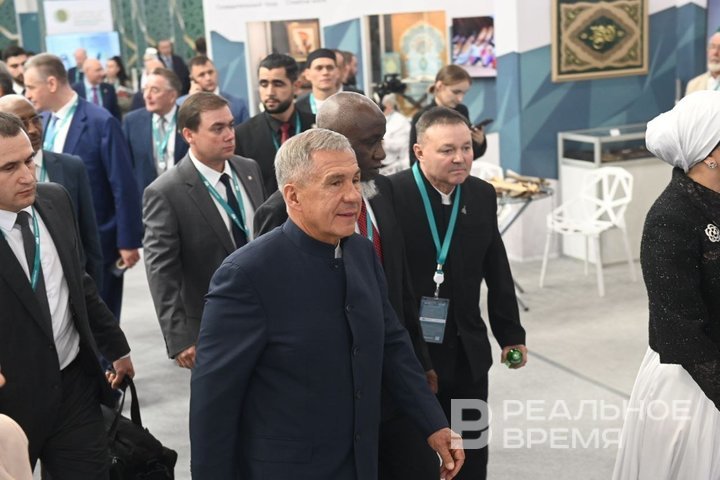
In addition, the number of tourists has increased two and a half times — exceeding 20 million people. Welcoming the forum participants, Dr Ahmad Kawesa Sengendo, Deputy Secretary General of the Organisation of Islamic Cooperation for Economic Affairs, also placed emphasis on the spread of halal products both in Russia and globally. According to his forecast, the global turnover of halal products will reach $7.7 trillion in 2025 and grow to $9.45 trillion by 2034. Russia holds an important place in this market, with the turnover of halal goods in the country increasing by 35%, he noted.
Hiba versus riba?
The Russia — Islamic World: KazanForum 2025 International Economic Forum has been held with federal status for the third year, which is why its agenda has come to cover a wide range of topics — from international logistics and business to the halal industry and fashion. However, originally, 16 years ago, the forum was conceived solely as a discussion platform for promoting Islamic banking. At that time, republican authorities first spoke about Islamic banking as a potential alternative source of direct foreign investment for the real sector of the economy. After the federal authorities launched an experiment on partnership financing on 1 September 2023, each opening session of the forum has been dedicated to discussing the results.
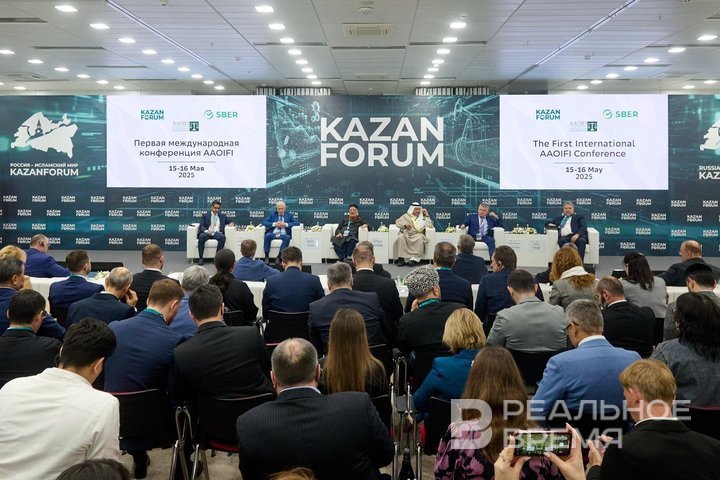
But this year, the plenary session on the topic: “Utilising the Potential of Partnership Finance in the Economic Development of the Russian Federation” took place on the eve of the experiment’s conclusion. As is known, from 1 September, Islamic banking will de jure cease to operate unless it is extended for a new period. So, today a discussion was effectively launched on the duration for which the experiment should be extended. Previously, a technical decision had been made to prolong it until 2028. The corresponding bill, which enshrines this provision, has been submitted to the State Duma and may be adopted before the end of the spring session, said Anatoly Aksakov, the chairman of the State Duma Committee on the Financial Market, at the plenary session.
Anatoly Aksakov personally holds a different position and advocates for an immediate extension of five years — until 2030. “Three years is too short because time will fly by quickly, just like these past two years,” he remarked during the discussion. According to him, this period will not be sufficient for all participants in the Islamic banking market to mobilise.
“The lessons of the financial crisis have shown that the traditional banking system does not always respond effectively to the challenges of the time. Under conditions of geopolitical tension, Islamic banking will develop faster. The potential is up to 500 billion rubles,” he assessed the bright future of the new instruments.
However, for now the potential remains untapped. Anatoly Aksakov pointed to the low volume of partnership financing deals. “3.1 billion rubles is little, very little,” he lamented. In fact, he cited outdated data. According to the results for 2024, the volume of deals in Tatarstan reached 4.5 billion rubles, said the Minister of Economy of Tatarstan, Midhat Shagiakhmetov, in February. On the other hand, the Central Bank’s register lists 31 participants, half of whom are from Tatarstan. The other three regions — Bashkortostan, Dagestan, and Chechnya — show low activity.
What prevents making it permanent?
“Not all participants have officially joined the experiment; it is necessary to attract players to the register and equalise conditions for all participants in the Islamic banking market,” agreed Deputy Finance Minister of the Russian Federation Ivan Chebeskov, who joined the discussion via video conference. The fact that the majority of players continue to operate in the “grey zone” concerns the federal authorities.
“But the Central Bank holds the opposite position. To end this experiment and move to permanent regulation (i.e., to make it permanent),” countered State Secretary — Deputy Chairman of the Bank of Russia Alexey Guznov, who served as the session moderator.
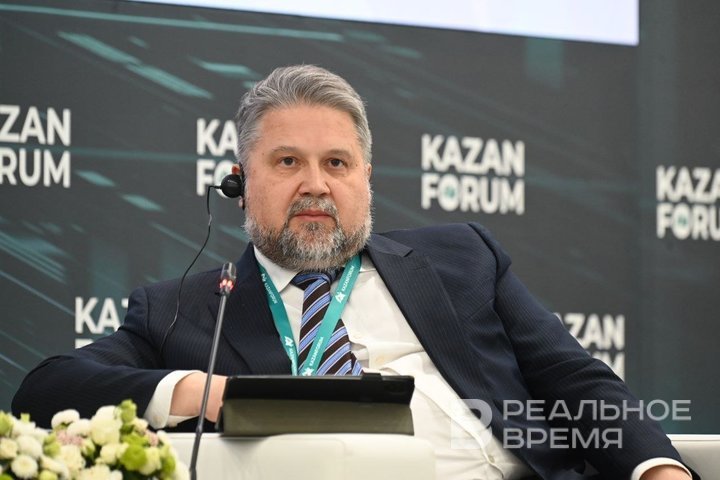
“That is a good proposal,” supported him Anatoly Aksakov, the chairman of the State Duma Committee on the Financial Market. He noted that an additional five years would give other players the opportunity to mobilise and involve other regions. According to him, Ingushetia, Crimea, and Chuvashia, where many Tatars live, want to join the experiment.
The session moderator then rightly asked why, under equal conditions, the experiment is progressing successfully in Tatarstan but barely advancing in other participating regions. “There is great trust in the republic’s authorities,” replied State Duma deputy from the Republic of Tatarstan Ayrat Farakhov.
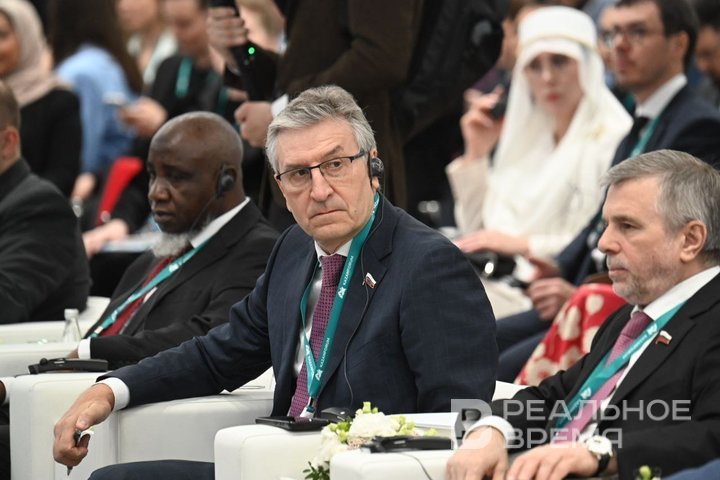
Another reason for extending the experiment lies in the need to implement Islamic banking accounting standards into Russian practice. Senior Vice-President of Sberbank Oleg Ganeev proposed adopting the widely accepted AAOIFI standards used in the Muslim world. According to him, Sberbank has already transitioned to these standards, with 16 products in its portfolio and a deal volume of 30 billion rubles.
PSB Bank announced the launch of two Islamic products. According to PSB Vice-President Dmitry Makeev, there is strong demand for such services from businesses. The bank has already obtained a fatwa for both products aimed at business clients — an Islamic account and partnership auto-factoring.
In conclusion, Anatoly Aksakov explained that during the first reading, it is proposed to extend the experiment by three years without changing the number of participating regions. “However, by the second reading, an initiative to extend it by five years will most likely be introduced. Three years is perceived by many as a period during which time will pass, ideas will not be realised, and the experiment will end without the ideas being implemented,” he explained.
The Central Bank believes that additional time is needed to adapt to the new standards and establish a supervisory system. “The goal is not to make the experiment permanent, but to implement permanent regulation; such a position does indeed exist,” Alexey Guznov explained later.
“We see that the legal regulatory system requires additional preparation in order to implement the standards. The time allotted for the experiment is meant to allow adaptation and to establish supervision. There are risks, but they are less related to credit and currency, and more operational. Permanence means that we must move to permanent regulation, but we are not ready for that yet. So far, a consensus has been reached on three years, and we consider this correct, as this period allows banks, participants, and the regulator to mobilise. An impromptu arrangement cannot be permanent,” he concluded.
